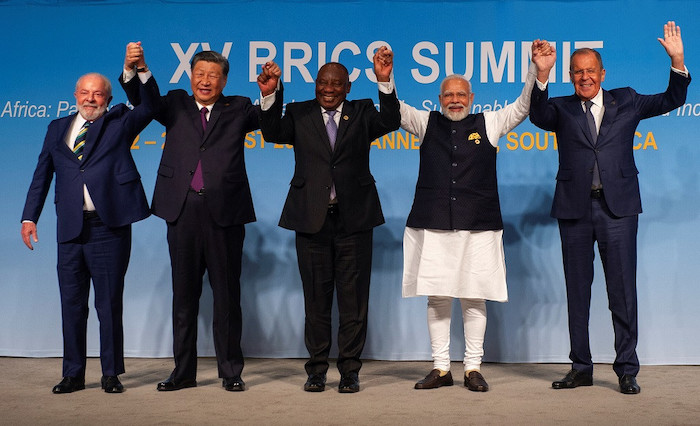The five BRICS developing nations have ignored Nigeria but announced that they would admit Saudi Arabia, Iran, Ethiopia, Egypt, Argentina, and the United Arab Emirates.
This move is aimed at growing the strength of the bloc as it pushes to rebalance the world order dominated by the US and western countries.
The expansion announced on Thursday, August 24, could also pave the way for other countries to seek admission.
BRICS – whose acronym was originally coined by an economist at Goldman Sachs, currently comprises Brazil, Russia, India, China, and South Africa.
BRICS has pledged to address the grievances of member countries over a world order they feel favours the US more than other emerging economies.
Economic sanctions imposed by the West on Russia for its invasion of Ukraine and China’s declining relations with the United States are spurring the bloc to turn BRICS into a strong counterweight to the West economically and politically.
“BRICS has embarked on a new chapter in its effort to build a world that is fair, a world that is just, a world that is also inclusive and prosperous,” said South African President Cyril Ramaphosa, who is hosting a summit of BRICS leaders.
The six candidate countries will formally become members on Jan. 1, 2024. Ramaphosa and Brazilian President Luiz Inacio Lula da Silva left the door open to the possibility of admitting other countries in the future.
“We have consensus on the first phase of this expansion process and other phases will follow,” Ramaphosa said at a media briefing.
Lula said globalisation’s promises had failed, adding that it was time to revitalise cooperation with developing countries as “there is a risk of nuclear war.”
United Arab Emirates President Mohammed bin Zayed, whose country is already a shareholder of the bloc’s New Development Bank, said he appreciated the inclusion of his country in the expansion.
This membership expansion is historic,” said Chinese President Xi Jinping, whose nation is the most powerful in the group of non-Western states that represents a quarter of the world’s economy.
“The expansion is also a new starting point for BRICS cooperation. It will bring new vigour to the BRICS cooperation mechanism and further strengthen the force for world peace and development”.
Ethiopian Prime Minister Abiy Ahmed hailed what he called “a great moment” for his country, the second-most populous in Africa.
“Ethiopia stands ready to cooperate with all for an inclusive and prosperous global order,” he said on X, formerly known as Twitter.
Nigeria at BRICS
Nigeria’s Vice-President Kashim Shettima says Nigeria is seeking a partnership that provides opportunities for all to engage in trade, prosperity and shared progress with no marginalisation.
The vice-president spoke at the 15th BRICS summit held in Johannesburg, South Africa.
On August 21, Shettima departed Nigeria to represent President Bola Tinubu at the 15th BRICS (Brazil, Russia, India, China and South Africa) summit.
In a statement on Thursday by Olusola Abiola, director of information in the office of the vice-president, Shettima emphasised global governance reform as a necessity for partnerships that ensure inclusivity and sustainable development.
He said the outlined agenda of the meeting aligns with “the aspiration of the people we represent and the future citizens of a world that can ensure our collective prosperity”.
“We want a partnership that guarantees a world governed by acceptable rules and norms,” he said.
“We seek a partnership that provides opportunities for all to engage in trade, prosperity, and shared progress with no marginalisation based on geography, race and legitimate sovereign affiliations.”
“These nations confront historical developmental vulnerabilities and challenges that are beyond their control.
“Thus, it is imperative for us to unite within regional groups and forge a novel form of international cooperation.
“This endeavour aims to foster global economic governance reform while enhancing the representation and voice of emerging market economies or developing countries.”
Shettima said Nigeria is committed to playing a major role in shaping global framework and governance concerning areas of finance, climate change, digital economy and post-pandemic recovery matters.

